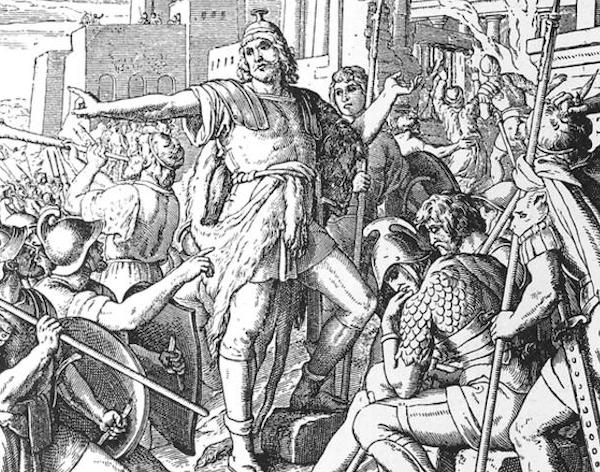Judah Maccabee purifies the Temple, etching by Julius von Carolsfeld, 1860.
Every year, we look forward to Chanukah, even though it is not even mentioned in the Torah. Its name means “Dedication” and it starts on erev the 25th of Kislev, which, this year, falls on the night of Nov. 28.
The festival celebrates the triumph of the Maccabees, led by Mattityahu and, later, by his son Judah, over the Greek Syrians, led by Antiochus. As a result, Jewish sovereignty was reestablished in Judea for a time.
But we should not forget that this ancient conflict was also a civil war between the Jewish people themselves. The Hellenists admired Greek culture, which they began to emulate; whereas the Maccabees remained steadfast in their adherence to Judaism’s ideals and beliefs. The factions disagreed on various issues, including the rite of circumcision, a fundamental and crucial Jewish ritual that the Hellenists claimed violated the perfection of the body.
In 175 BCE, Antiochus tried to wipe out the Jewish religion entirely by substituting the Greek language, gods and customs. The final blow came when the Temple was defiled and a giant statue of the Greek god Zeus was erected there, with the Jews ordered to worship it.
Some, like Hannah and her seven sons, resisted passively, choosing death rather than idol worship. Hundreds hid in caves and some suffocated to death. But there was no active resistance until the Hasmonean family of Mattityahu and his sons at Modi’in raised a banner: “Whoever is for the Lord, follow me!”
A small army was formed, with Judah Maccabee as its leader. Antiochus sent three armies to suppress the revolt, but the Maccabees triumphed. Their first priority after victory was to purify the Temple.
As the story goes, all the cruses of oil had been defiled except one. Instead of burning for just one day, it miraculously lasted for eight days, until more holy oil could be acquired. Hence, the celebration of Chanukah for eight nights and days.
Today, Chanukah still has relevance. We remember not only the heroism of the Maccabeans, but other heroic acts. Many times in Israel we have seen the victory of a tiny nation against a larger and stronger one, the few against the many.
In 1948, the young Israel Defence Forces defeated much larger Arab armies to usher in the independent state of Israel. Earlier, in the Second World War, there was widespread Jewish resistance to Hitler’s brutal policies and Jews fought in the ghettos and joined partisan units in forests outside Polish and Russian cities conquered by the Nazis.
Israel’s operation into Entebbe to rescue hostages in Uganda is another instance of modern heroism and our history abounds with examples. The revolt of the Hasmoneans is the symbol of the spirit of Zionism. Today, in Western society, no tyrant is forcing us to abandon our faith, but many Jews are in great danger of losing their Jewish identity nonetheless. Hellenism, in a different form, is alive and well.
Chanukah has broad human significance as a festival of liberty and religious freedom, not just for us, but for all people. It is a humanistic festival. The symbol of Chanukah is light and the real miracle is that, despite millennia of persecution and dispersion, the light of our people has never been extinguished.
Dvora Waysman has written 14 books, and the film The Golden Pomegranate was based on her book The Pomegranate Pendant. Her latest novel is Searching for Sarah. She can be contacted at dwaysman@gmail.com.

